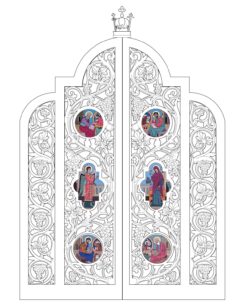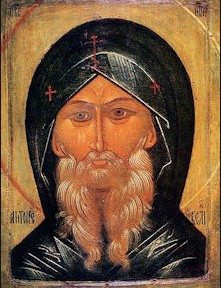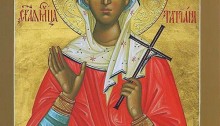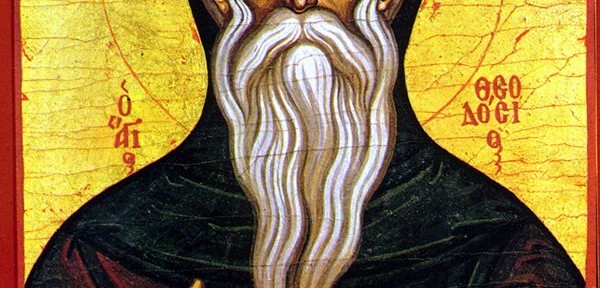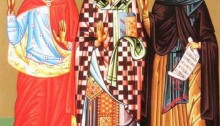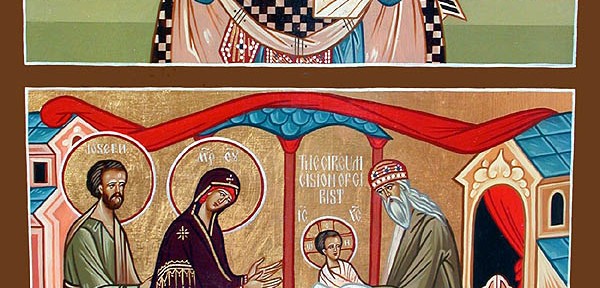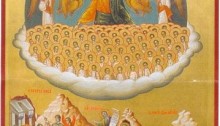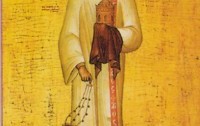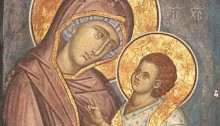Anthony was an Egyptian and was born about the year 250 A.D. in the village of Koman near Herculea. Following the demise of his noble and wealthy parents, he divided the inherited estate with his sister, who was a minor, and provided for her with some relatives. Anthony distributed his half of the estate to the poor and, he, in his twentieth year, dedicated himself to the ascetical life for which he yearned from his childhood. In the beginning Anthony lived a life of asceticism in the proximity of his village but, in order to flee the disturbances of people, he withdrew into the wilderness on the shore of the Red Sea, where he spent twenty years as a recluse not associating with anyone except with God through constant prayer, reflection and contemplation, patiently enduring unspeakable temptations from the devil. His fame spread throughout the entire world and many disciples gathered around him whom he placed on the path of salvation by his example and words. During the eighty-five years of his ascetical life, only twice did he go to Alexandria. The first time to seek martyrdom during the time of the persecution of the Church and, the second time at the invitation of St. Athanasius, in order to refute the accusation of the Arians: supposedly that he, too, was an adherent of the Arian heresy. Anthony died in the one-hundred fifth year of his life, leaving behind an entire army of his disciples and imitators. Even though Anthony was not a scholar, nevertheless, he was a counselor and teacher of the most learned men of that time, as was St. Athanasius the Great. When certain Greek philosophers tempted him with literary wisdom, Anthony shamed them with the question: “Which is older, the understanding or the book? Which of these two was the cause of the other?” Ashamed, the philosophers dispersed for they perceived that they only had literary knowledge without understanding and Anthony had understanding. Here is a man who attained perfection in as far as man, in general, can attain on earth. Here is an instructor to instructors and a teacher to teachers, who, for a full eighty five years perfected himself and only in that way was he able to perfect many others. Filled with many years of life and great works, Anthony died in the Lord in the year 335 A.D. (Prologue of Ohrid) Continue reading January 17, 2014 Venerable and God-Bearing Father Anthony the Great
Continue reading January 17, 2014 Venerable and God-Bearing Father Anthony the Great
Category: Texts
January 12, 2014 Sunday after Theophany, Octoechos Tone 1 Holy Martyr Tatiana the Deaconess
Tatiana was a Roman whose parents were of great nobility. She was a Christian and a deaconess in the church. After the death of Emperor Heliogabalus, Emperor Alexander, whose mother Mammaea was a Christian, reigned in Rome. The emperor himself was wavering and indecisive in the Faith for he kept statues of Christ, Apollo, Abraham and Orpheus in his palace. His chief assistants persecuted the Christians without the emperor’s orders. When they brought out the virgin Tatiana for torture, she prayed to God for her torturers. And behold, their eyes were opened and they saw four angels around the martyr. Seeing this, eight of them believed in Christ for which they also were tortured and slain. The tormentors continued to torture St. Tatiana. They whipped her, cut off parts of her body; they scraped her with irons. So all disfigured and bloody, Tatiana was thrown into the dungeon that evening so that the next day, they could, again, begin anew with different tortures. But God sent His angels to the dungeon to encourage her and to heal her wounds so that, each morning, Tatiana appeared before the torturers completely healed. They threw her before a lion, but the lion endeared himself to her and did her no harm. They cut off her hair, thinking, according to their pagan reasoning, that some sorcery or some magical power was concealed in her hair. Finally, Tatiana along with her father were both beheaded. Thus, Tatiana ended her earthly life about the year 225 A.D., and this heroic virgin, who had the fragile body of a woman but a robust and valiant spirit, was crowned with the immortal wreath of glory. (Prologue of Ohrid)
 Continue reading January 12, 2014 Sunday after Theophany, Octoechos Tone 1 Holy Martyr Tatiana the Deaconess
Continue reading January 12, 2014 Sunday after Theophany, Octoechos Tone 1 Holy Martyr Tatiana the Deaconess
January 11, 2014 Our Venerable Father Theodosius, Founder of the Ceneobitic Life
Theodosius was the first founder and organizer of the cenobitic way of monastic life. He was born in the province of Cappadocia in the village of Mogarissus of devout parents. As a child, he visited St. Simeon the Stylite who blessed him and prophesied great and spiritual honors about him. With a thurible [censer] in which he placed unburned charcoal and incense, Theodosius sought out a place where he could settle and establish his monastery and stopped when the charcoal fired up on its own. Here, he settled and began to live the ascetical life. Soon, he gathered around him many monks of various nationalities. He built a church for each nationality so that, at the same time, services and hymns were offered to God in Greek, Armenian, Georgian, etc. But, on the day of Holy Communion, all the brotherhood gathered in the great church in which the Greek language was used. There was a communal table for all, communal property, communal penance, communal labor, communal patience and, not too rare, communal hunger. Theodosius was an exalted model of life to all the monks; an example in labor, prayer, fasting, watchfulness and in all Christian virtues. God granted him the gift of working miracles by which he was able to heal the sick, to appear from a distance, to tame wild beasts, to discern the future and to cause bread and wheat to multiply. Prayer was on his lips day and night. He died peacefully in the Lord in the year 529 A.D., the one-hundred fifth year after his birth. (Prologue of Ohrid) Continue reading January 11, 2014 Our Venerable Father Theodosius, Founder of the Ceneobitic Life
Continue reading January 11, 2014 Our Venerable Father Theodosius, Founder of the Ceneobitic Life
January 6, 2014 The Holy Theophany of our Lord, God and Saviour Jesus Christ
When our Lord reached thirty years from His physical birth, He began His teaching and salvific work. He Himself signified this “beginning of the beginning” by His baptism in the Jordan river. St. Cyril of Jerusalem says, ” The beginning of the world – water; the beginning of the Good News – Jordan.” At the time of the baptism of the Lord in water, that mystery was declared to the world: that mystery which was prophesied in the Old Testament; the mystery about which in ancient Egypt and India was only fabled; i.e., the mystery of the Divine Holy Trinity. The Father was revealed to the sense of hearing; the Spirit was revealed to the sense of sight, and in addition to these, the Son was revealed to the sense of touch. The Father uttered His witness about the Son, the Son was baptized in the water, and the Holy Spirit in the form of a dove hovered above the water. When John the Baptist witnessed and said about Christ, “Behold, the Lamb of God, Who takes away the sins of the world”
(St. John 1:29), and when John immersed and baptized the Lord in the Jordan, the mission of Christ in the world and the path of our salvation was shown. That is to say: The Lord took upon Himself the sins of mankind and died under them [immersion] and became alive again [the coming out of the water]; and we must die as the old sinful man and become alive again as cleansed, renewed and regenerated. This is the Savior and this is the path of salvation. The Feast of the Epiphany [Theophany in Greek] is also called the Feast of Illumination. For us, the event in the Jordan river illuminates, by manifesting to us God as Trinity, consubstantial and undivided. That is one way. And, the second: everyone of us through baptism in water is illumined by this, that we become adopted by the Father of Lights through the merits of the Son and the power of the Holy Spirit. (Prologue of Ohrid) Continue reading January 6, 2014 The Holy Theophany of our Lord, God and Saviour Jesus Christ
Continue reading January 6, 2014 The Holy Theophany of our Lord, God and Saviour Jesus Christ
January 5, 2014 Sunday before Theophany, Octoechos Tone 8 Holy Martyrs Theopemptus and Theona Venerable Woman Syncletica
When Diocletian began his persecution of the Christians, Theopempos, Bishop of Nicomedia, was among the first to suffer martyrdom for Christ. Theopempos was brought before the emperor who threatened him with punishment of death if he did not deny Christ. To that threat, the courageous bishop responded to the emperor: “It stands written, `Do not be afraid of those who kill the body’ (St. Luke 12:4), `but cannot kill the soul’ (St. Matthew 10:28). O Emperor, you have authority over my body; do with it what pleases you.” Theopempos was severely beaten, suffered from hunger and tortured in various ways. Finally, the emperor summoned a certain magician, Theonas by name, to outwit this godly man through magic. Theonas dissolved the most potent poison in water and gave it to Theopempos to drink. Theopempos traced the sign of the cross over the glass and drank the poison. Theonas, upon seeing that the poison had no effect on Theopempos, turned to the emperor and shouted, ” I, too, am a Christian and bow down before the Crucified One.” Both were sentenced to death in the year 298 A.D.; Theopempos was beheaded and Theonas was buried alive. They honorably suffered and became citizens of the Kingdom of Christ. (Prologue of Ohrid) Continue reading January 5, 2014 Sunday before Theophany, Octoechos Tone 8 Holy Martyrs Theopemptus and Theona Venerable Woman Syncletica
Continue reading January 5, 2014 Sunday before Theophany, Octoechos Tone 8 Holy Martyrs Theopemptus and Theona Venerable Woman Syncletica
January 1, 2014 The Circumcision of Our Lord, God and Saviour Jesus Christ Our Father Among the Saints Basil the Great, Archbishop of Caesarea in Cappadocia (379) Gregory of Nazianzis, father of Gregory the Theologian (374) Holy Martyr Basil of Ankyra (322)
The eighth day following His birth, the Divine Child was presented in the Temple and circumcised according to the Law existing in Israel since the time of Abraham. On this occasion, He was given the name Jesus, which the Archangel Gabriel announced to the All-Holy Virgin Mary. The Old Testament circumcision was the proto-type of the New Testament baptism. The circumcision of our Lord shows that He received upon Himself the true body of man and not just seemingly, as was later taught of Him by heretics. Our Lord was also circumcised because He wanted to fulfill the entire Law which He Himself gave through the prophets and forefathers. In fulfilling the written Law, He replaced it with Baptism in His Holy Church as was proclaimed by the Apostle Paul: “For neither does circumcision mean anything, nor does uncircumcision, but only a new creation” (Galatians 6:15).
Basil was born during the reign of Emperor Constantine. While still unbaptized, Basil spent fifteen years in Athens where he studied philosophy, rhetoric, astronomy and all other secular sciences of that time. His colleagues at that time were Gregory the Theologian and Julian, later the apostate emperor. In his mature years he was baptized in the river Jordan along with Euvlios his former teacher. He was Bishop of Caesarea in Cappadocia for almost ten years and completed his earthly life fifty years after his birth. He was a great defender of Orthodoxy, a great light of moral purity, a religious zealot, a great theological mind, a great builder and pillar of the Church of God. Basil fully deserved the title “Great.” In liturgical services, he is referred to as the “bee of the Church of Christ which brings honey to the faithful and with its stinger pricks the heretics.” Numerous works of this Father of the Church are preserved; they include theological, apologetical, ascetical and canonical writings as well as the Holy and Divine Liturgy named after him. This Divine Liturgy is celebrated ten times throughout the year: the First of January, his feast day; on the eve of the Nativity of our Lord; on the eve of the Epiphany of our Lord; all Sundays of the Honorable Fast [Lenten Season], except Palm Sunday; on Great and Holy Thursday and on Great and Holy Saturday. St. Basil died peacefully on January 1, 379 A.D., and was translated into the Kingdom of Christ. (Prologue of Ohrid)
December 29, 2013 Sunday after the Nativity of our Lord God and Saviour Jesus Christ Holy and Just Joseph, King David and James, Brother of the Lord in the Flesh Octoechos Tone 7
When the Magi from the east did not return to Jerusalem from Bethlehem to inform Herod about the newborn King but rather, at the angel’s command, returned to their homeland another way, Herod became as enraged as a wild beast and ordered all the children two years old and under in Bethlehem and its surroundings to be killed. This frightening command of the king was carried out to the letter. His soldiers beheaded some of the children with swords, smashed others against stones, trampled others underfoot, and strangled others with their hands. And the cries and wails of the mothers rose to heaven, Lamentation, and bitter weeping; Rachel weeping for her children (Jeremiah 31:15, Matthew 2:18), as had been prophesied. This crime against the multitude of innocent children was carried out a year after the birth of Christ, at the time when Herod was seeking to find the Divine Child. He asked Zacharias about his son John, so that he might kill him, since he naturally thought that John was the new king. As Zacharias did not turn John over, he was slain in the Temple by order of Herod. St. Simeon the God-receiver would also have been murdered soon after the Presentation in the Temple, had he not already reposed in God. After murdering the children of Bethlehem, Herod turned against the Jewish elders who had revealed to him where the Messiah would be born. He then killed Hyrcanes, the high priest, and the seventy elders of the Sanhedrin. Thus, they who had agreed with Herod that the new Child-king must be killed came to an evil end. After that, Herod murdered his brother, sister, wife and three sons. Finally, God’s punishment came to him: he began to tremble, his legs became swollen, the lower part of his body became putrid, and worms came out of the sores; his nose became blocked and an unbearable stench emanated from him. Before his last breath, he remembered that there were many captive Jews in prison, and he ordered that they all be killed so that they would not rejoice in his death. Thus, this terrible ruler gave up his inhuman soul and handed it over to the devil for eternal possession. (Prologue of Ohrid) Continue reading December 29, 2013 Sunday after the Nativity of our Lord God and Saviour Jesus Christ Holy and Just Joseph, King David and James, Brother of the Lord in the Flesh Octoechos Tone 7
Continue reading December 29, 2013 Sunday after the Nativity of our Lord God and Saviour Jesus Christ Holy and Just Joseph, King David and James, Brother of the Lord in the Flesh Octoechos Tone 7
December 27, 2013 Holy Apostle, First Martyr and Archdeacon Stephen
Stephen was a kinsman of the Apostle Paul and one of those Jews who lived in the Hellenic provinces. Stephen was the first of the seven deacons whom the holy apostles ordained and appointed to the service of assisting the poor in Jerusalem. For this, he is called the archdeacon. By the power of his faith, Stephen worked great miracles among the people. The wicked Jews disputed with him, but they were always defeated by his wisdom and the power of the Spirit, Who acted through him. Then the shameful Jews, accustomed to calumnies and slander, incited the people and the elders of the people against the innocent Stephen, slandering him as though he had blasphemed against God and against Moses. False witnesses were quickly found who confirmed this. Stephen then stood before the people, and all saw his face as it had been the face of an angel (Acts 6:15), that is, his face was illumined with the light of grace as was once the face of Moses when he spoke with God. Stephen opened his mouth and enumerated the many good works and miracles that God had performed in the past for the people of Israel, as well as the many crimes and opposition to God on the part of this people. He especially rebuked them for the killing of Christ the Lord, calling them betrayers and murderers (Acts 7:52). And while they gnashed their teeth, Stephen beheld and saw the heavens open and the glory of God. That which he saw, he declared to the Jews: Behold, I see the heavens opened and the Son of Man standing on the right hand of God! (Acts 7:56). Then the malicious men took him outside the city and stoned him to death. Among his persecutors was his kinsman Saul, later the Apostle Paul. At that time, the Most-holy Theotokos, standing on a rock at a distance with St. John the Theologian, witnessed the martyrdom of this first martyr for the truth of her Son and God, and she prayed to God for Stephen. This occurred one year after the descent of the Holy Spirit upon the apostles. Gamaliel, a prince of the Jews and a secret Christian, clandestinely took St. Stephen’s body and buried it on his own estate. Thus, this first among the Christian martyrs gloriously reposed and took up his habitation in the Kingdom of Christ God. (Prologue of Ohrid) Continue reading December 27, 2013 Holy Apostle, First Martyr and Archdeacon Stephen
Continue reading December 27, 2013 Holy Apostle, First Martyr and Archdeacon Stephen
December 26, 2013 Synaxis of the Most Holy Mother of God
On the second day of the Nativity, the Christian Church gives glory and thanksgiving to the Most-holy Theotokos, who gave birth to our Lord, God and Savior Jesus Christ. This feast is called “the Synaxis” because on this day all of the faithful gather to glorify her, the Most-holy Theotokos, and to solemnly and universally celebrate a feast in her honor. In Ohrid, it has been the tradition from ancient times that, on the eve of the second day of Nativity, Vespers has been celebrated only in the Church of the Most-holy Theotokos called the Chieftain [Èelnica]. All the clergy with the people gather together to glorify the Most-pure Mother of God. (Prologue of Ohrid) Continue reading December 26, 2013 Synaxis of the Most Holy Mother of God
Continue reading December 26, 2013 Synaxis of the Most Holy Mother of God
December 25, 2013 Nativity in the Flesh of our Lord God and Saviour Jesus Christ
But when the fullness of the time had come, God sent forth His Son (Galatians 4:4) to save the human race. And when nine months were fulfilled from the Annunciation, when the Archangel Gabriel had appeared to the Most-holy Virgin in Nazareth, saying, Rejoice, thou that art highly favored … behold, thou shalt conceive in thy womb, and bring forth a Son (Luke 1:28, 31), at that time there went forth a decree from Caesar Augustus that all the people of the Roman Empire should be taxed. In accordance with this decree, everyone had to go to his own town and be registered. That is why the righteous Joseph came with the Most-holy Virgin to Bethlehem, the city of David, for they were both of the royal lineage of David. Since many people descended on this small town for the census, Joseph and Mary were unable to find lodging in any house, and they sought shelter in a cave which shepherds used as a sheepfold. In this cave-on the night between Saturday and Sunday, on the 25th of December-the Most-holy Virgin gave birth to the Savior of the world, the Lord Jesus Christ. Giving birth to Him without pain just as He was conceived without sin by the Holy Spirit and not by man, she herself wrapped Him in swaddling clothes, worshiped Him as God, and laid Him in a manger. Then the righteous Joseph drew near and worshiped Him as the Divine Fruit of the Virgin’s womb. Then the shepherds came in from the fields, directed by an angel of God, and worshiped Him as the Messiah and Savior. The shepherds heard a multitude of God’s angels singing: Glory to God in the highest, and on earth peace, good will toward men (Luke 2:14). At that time three wise men arrived from the east, led by a wondrous star, bearing their gifts: gold, frankincense and myrrh. They worshiped Him as the King of kings, and offered Him their gifts (Matthew 2). Thus entered the world He Whose coming was foretold by the prophets, and Who was born in the same manner in which it had been prophesied: of a Most-holy Virgin, in the town of Bethlehem, of the lineage of David according to the flesh, at the time when there was no king in Jerusalem of the lineage of Judah, but rather when Herod, a foreigner, was reigning. After many types and prefigurings, messengers and heralds, prophets and righteous men, wise men and kings, finally He appeared, the Lord of the world and King of kings, to perform the work of the salvation of mankind, which could not be performed by His servants. To Him be eternal glory and praise! Amen. (Prologue of Ohrid) Continue reading December 25, 2013 Nativity in the Flesh of our Lord God and Saviour Jesus Christ
Continue reading December 25, 2013 Nativity in the Flesh of our Lord God and Saviour Jesus Christ
